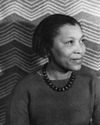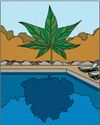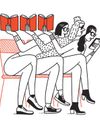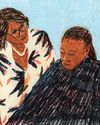
He had ransacked his mind but he could not remember and he could not recall many other things besides. The period before his arrival, for instance. He knew he came from elsewhere. His appearance made that abundantly clear, and he did not speak the islanders' language, although between gestures and the few words of his own language the islanders knew, he could communicate most of his basic needs.
The island was small. If one cared to, one could walk from one end to the other in a matter of hours. To reach the southern tip, where there was a swimming beach, he sometimes took one of the small buses that circulated throughout the day. Across the hazy sea to the south, one saw a city on a far-off coastline, with factories lining its harbor, whose tall chimneys emitted knotted white streams. An unmaintained road led from the swimming beach into steep hills above, where an abandoned complex of concrete structures had been overrun by bushes and ivy. To the north, not visible from the beach, was a distant shore, where rows of mountains resembling jagged waves disappeared into the mist.
The island itself had a teardrop shape. Craint knew this from a map at the bus depot and another at the ferry terminal. Its northern half had been given over to mining ventures.
Large machines dug up the rocky waste and pulverized it into powder and gravel. He had seen images of this in the small museum devoted to the island's history, where, unable to read the explanatory texts, he had had to invent his own history from the photographs and dates.
The problems with his memory made Craint reluctant to ask questions that might cause him to appear foolish. At his hotel he refrained from asking how many nights he had stayed, afraid such an inquiry might call attention to the bill he had no means of paying. For now, at least, the proprietors seemed unconcerned about their guest's ability to meet his obligations.
Denne historien er fra November 11, 2024-utgaven av The New Yorker.
Start din 7-dagers gratis prøveperiode på Magzter GOLD for å få tilgang til tusenvis av utvalgte premiumhistorier og 9000+ magasiner og aviser.
Allerede abonnent ? Logg på
Denne historien er fra November 11, 2024-utgaven av The New Yorker.
Start din 7-dagers gratis prøveperiode på Magzter GOLD for å få tilgang til tusenvis av utvalgte premiumhistorier og 9000+ magasiner og aviser.
Allerede abonnent? Logg på

MING HAN ONG
Thadeus had never offered to take Johnny Mac out for a meal before. This is new, Johnny Mac says, grinning. For twenty-five years, Johnny Mac worked as a tenant-rights lawyer. He is a fount of varied and surprising knowledge.

ZORA NEALE HURSTON'S CHOSEN PEOPLE
What a long-unpublished novel reveals about her magnificent obsession.

FEAR AND LOATHING
Are all our arguments really over who's harmed?

ODD JOBS
\"Severance,\" on Apple TV+.

ON A MISSION FROM GOD
Inside the movement to redirect billions of taxpayer dollars to private religious schools.

MAKE HIM LAUGH
How Lorne Michaels's sensibility governs \"Saturday Night Live.\"

TABULA RASA
“Bleb” is worth eight points in Scrabble. Thought you might like to know. I have known the word since Wednesday, June 11, 1958, when I learned it from a company physician at Time Incorporated, in Rockefeller Center. He said I should have been hospitalized four days ago, but there was nothing much to do about it now, go back to work.

WELCOME TO OUR FIRST/FINAL BOOK CLUB!
Thank you, everyone, for coming to our first/final book-club meeting. Apologies for how long it's taken us to settle on a date, but in between work, kids, and the pretense of joining adult recreational sports leagues, it seems that we all have incredibly busy schedules.

THE POISON MACHINE
The talk-show host Yinon Magal's hard-line tactics.

MEAN TIME
“Hard Truths.”